#media failures
Explore tagged Tumblr posts
Text
Nicholas Carlson Launches Video Media Start-Up Dynamo
Nicholas Carlson’s New Venture in the Video Landscape Nicholas Carlson has been a keen observer of spectacular failures across the tech and media industries throughout his career. As the former chief editor of Business Insider, he meticulously documented the downfall of major players like Yahoo and Groupon. More recently, he watched as numerous Silicon Valley companies and competing publications…
#business journalism#Dynamo#LinkedIn#media failures#media start-up#Mr. Beast#Nicholas Carlson#tech industry#TikTok#video content#video storytelling#YouTube
0 notes
Text

They say DEI with a hard R.
353 notes
·
View notes
Text
My mom, after spending an extended weekend with my dad's old college classmates and their families: It's so weird that all of these very weird, intelligent and structured men who got their masters in engineering in the late 1980s have sons that are all autistic and daughters who all have mood disorders.
Me: Yeah, very weird. Why could that be?
#autism#depression#something tells me the daughters are also autistic#I mean I know I am#our brothers just got diagnosed in elementary school and got help and accomodations#while we were labeled gifted and got no help at all#just more responsibilities and pressure#until we burned out at the ripe old age of 16#and were now feeling as failures and disappointments to our parents on top of everything else#while also being the first generation to grow up with social media#idk that may just be me
992 notes
·
View notes
Text
Pluralistic: Leaving Twitter had no effect on NPR's traffic

I'm coming to Minneapolis! This Sunday (Oct 15): Presenting The Internet Con at Moon Palace Books. Monday (Oct 16): Keynoting the 26th ACM Conference On Computer-Supported Cooperative Work and Social Computing.

Enshittification is the process by which a platform lures in and then captures end users (stage one), who serve as bait for business customers, who are also captured (stage two), whereupon the platform rug-pulls both groups and allocates all the value they generate and exchange to itself (stage three):
https://pluralistic.net/2023/01/21/potemkin-ai/#hey-guys
Enshittification isn't merely a form of rent-seeking – it is a uniquely digital phenomenon, because it relies on the inherent flexibility of digital systems. There are lots of intermediaries that want to extract surpluses from customers and suppliers – everyone from grocers to oil companies – but these can't be reconfigured in an eyeblink the that that purely digital services can.
A sleazy boss can hide their wage-theft with a bunch of confusing deductions to your paycheck. But when your boss is an app, it can engage in algorithmic wage discrimination, where your pay declines minutely every time you accept a job, but if you start to decline jobs, the app can raise the offer:
https://pluralistic.net/2023/04/12/algorithmic-wage-discrimination/#fishers-of-men
I call this process "twiddling": tech platforms are equipped with a million knobs on their back-ends, and platform operators can endlessly twiddle those knobs, altering the business logic from moment to moment, turning the system into an endlessly shifting quagmire where neither users nor business customers can ever be sure whether they're getting a fair deal:
https://pluralistic.net/2023/02/19/twiddler/
Social media platforms are compulsive twiddlers. They use endless variation to lure in – and then lock in – publishers, with the goal of converting these standalone businesses into commodity suppliers who are dependent on the platform, who can then be charged rent to reach the users who asked to hear from them.
Facebook designed this playbook. First, it lured in end-users by promising them a good deal: "Unlike Myspace, which spies on you from asshole to appetite, Facebook is a privacy-respecting site that will never, ever spy on you. Simply sign up, tell us everyone who matters to you, and we'll populate a feed with everything they post for public consumption":
https://lawcat.berkeley.edu/record/1128876
The users came, and locked themselves in: when people gather in social spaces, they inadvertently take one another hostage. You joined Facebook because you liked the people who were there, then others joined because they liked you. Facebook can now make life worse for all of you without losing your business. You might hate Facebook, but you like each other, and the collective action problem of deciding when and whether to go, and where you should go next, is so difficult to overcome, that you all stay in a place that's getting progressively worse.
Once its users were locked in, Facebook turned to advertisers and said, "Remember when we told these rubes we'd never spy on them? It was a lie. We spy on them with every hour that God sends, and we'll sell you access to that data in the form of dirt-cheap targeted ads."
Then Facebook went to the publishers and said, "Remember when we told these suckers that we'd only show them the things they asked to see? Total lie. Post short excerpts from your content and links back to your websites and we'll nonconsensually cram them into the eyeballs of people who never asked to see them. It's a free, high-value traffic funnel for your own site, bringing monetizable users right to your door."
Now, Facebook had to find a way to lock in those publishers. To do this, it had to twiddle. By tiny increments, Facebook deprioritized publishers' content, forcing them to make their excerpts grew progressively longer. As with gig workers, the digital flexibility of Facebook gave it lots of leeway here. Some publishers sensed the excerpts they were being asked to post were a substitute for visiting their sites – and not an enticement – and drew down their posting to Facebook.
When that happened, Facebook could twiddle in the publisher's favor, giving them broader distribution for shorter excerpts, then, once the publisher returned to the platform, Facebook drew down their traffic unless they started posting longer pieces. Twiddling lets platforms play users and business-customers like a fish on a line, giving them slack when they fight, then reeling them in when they tire.
Once Facebook converted a publisher to a commodity supplier to the platform, it reeled the publishers in. First, it deprioritized publishers' posts when they had links back to the publisher's site (under the pretext of policing "clickbait" and "malicious links"). Then, it stopped showing publishers' content to their own subscribers, extorting them to pay to "boost" their posts in order to reach people who had explicitly asked to hear from them.
For users, this meant that their feeds were increasingly populated with payola-boosted content from advertisers and pay-to-play publishers who paid Facebook's Danegeld to reach them. A user will only spend so much time on Facebook, and every post that Facebook feeds that user from someone they want to hear from is a missed opportunity to show them a post from someone who'll pay to reach them.
Here, too, twiddling lets Facebook fine-tune its approach. If a user starts to wean themself off Facebook, the algorithm (TM) can put more content the user has asked to see in the feed. When the user's participation returns to higher levels, Facebook can draw down the share of desirable content again, replacing it with monetizable content. This is done minutely, behind the scenes, automatically, and quickly. In any shell game, the quickness of the hand deceives the eye.
This is the final stage of enshittification: withdrawing surpluses from end-users and business customers, leaving behind the minimum homeopathic quantum of value for each needed to keep them locked to the platform, generating value that can be extracted and diverted to platform shareholders.
But this is a brittle equilibrium to maintain. The difference between "God, I hate this place but I just can't leave it" and "Holy shit, this sucks, I'm outta here" is razor-thin. All it takes is one privacy scandal, one livestreamed mass-shooting, one whistleblower dump, and people bolt for the exits. This kicks off a death-spiral: as users and business customers leave, the platform's shareholders demand that they squeeze the remaining population harder to make up for the loss.
One reason this gambit worked so well is that it was a long con. Platform operators and their investors have been willing to throw away billions convincing end-users and business customers to lock themselves in until it was time for the pig-butchering to begin. They financed expensive forays into additional features and complementary products meant to increase user lock-in, raising the switching costs for users who were tempted to leave.
For example, Facebook's product manager for its "photos" product wrote to Mark Zuckerberg to lay out a strategy of enticing users into uploading valuable family photos to the platform in order to "make switching costs very high for users," who would have to throw away their precious memories as the price for leaving Facebook:
https://www.eff.org/deeplinks/2021/08/facebooks-secret-war-switching-costs
The platforms' patience paid off. Their slow ratchets operated so subtly that we barely noticed the squeeze, and when we did, they relaxed the pressure until we were lulled back into complacency. Long cons require a lot of prefrontal cortex, the executive function to exercise patience and restraint.
Which brings me to Elon Musk, a man who seems to have been born without a prefrontal cortex, who has repeatedly and publicly demonstrated that he lacks any restraint, patience or planning. Elon Musk's prefrontal cortical deficit resulted in his being forced to buy Twitter, and his every action since has betrayed an even graver inability to stop tripping over his own dick.
Where Zuckerberg played enshittification as a long game, Musk is bent on speedrunning it. He doesn't slice his users up with a subtle scalpel, he hacks away at them with a hatchet.
Musk inaugurated his reign by nonconsensually flipping every user to an algorithmic feed which was crammed with ads and posts from "verified" users whose blue ticks verified solely that they had $8 ($11 for iOS users). Where Facebook deployed substantial effort to enticing users who tired of eyeball-cramming feed decay by temporarily improving their feeds, Musk's Twitter actually overrode users' choice to switch back to a chronological feed by repeatedly flipping them back to more monetizable, algorithmic feeds.
Then came the squeeze on publishers. Musk's Twitter rolled out a bewildering array of "verification" ticks, each priced higher than the last, and publishers who refused to pay found their subscribers taken hostage, with Twitter downranking or shadowbanning their content unless they paid.
(Musk also squeezed advertisers, keeping the same high prices but reducing the quality of the offer by killing programs that kept advertisers' content from being published along Holocaust denial and open calls for genocide.)
Today, Musk continues to squeeze advertisers, publishers and users, and his hamfisted enticements to make up for these depredations are spectacularly bad, and even illegal, like offering advertisers a new kind of ad that isn't associated with any Twitter account, can't be blocked, and is not labeled as an ad:
https://www.wired.com/story/xs-sneaky-new-ads-might-be-illegal/
Of course, Musk has a compulsive bullshitter's contempt for the press, so he has far fewer enticements for them to stay. Quite the reverse: first, Musk removed headlines from link previews, rendering posts by publishers that went to their own sites into stock-art enigmas that generated no traffic:
https://www.theguardian.com/technology/2023/oct/05/x-twitter-strips-headlines-new-links-why-elon-musk
Then he jumped straight to the end-stage of enshittification by announcing that he would shadowban any newsmedia posts with links to sites other than Twitter, "because there is less time spent if people click away." Publishers were advised to "post content in long form on this platform":
https://mamot.fr/@pluralistic/111183068362793821
Where a canny enshittifier would have gestured at a gaslighting explanation ("we're shadowbanning posts with links because they might be malicious"), Musk busts out the motto of the Darth Vader MBA: "I am altering the deal, pray I don't alter it any further."
All this has the effect of highlighting just how little residual value there is on the platform for publishers, and tempts them to bolt for the exits. Six months ago, NPR lost all patience with Musk's shenanigans, and quit the service. Half a year later, they've revealed how low the switching cost for a major news outlet that leaves Twitter really are: NPR's traffic, post-Twitter, has declined by less than a single percentage point:
https://niemanreports.org/articles/npr-twitter-musk/
NPR's Twitter accounts had 8.7 million followers, but even six months ago, Musk's enshittification speedrun had drawn down NPR's ability to reach those users to a negligible level. The 8.7 million number was an illusion, a shell game Musk played on publishers like NPR in a bid to get them to buy a five-figure iridium checkmark or even a six-figure titanium one.
On Twitter, the true number of followers you have is effectively zero – not because Twitter users haven't explicitly instructed the service to show them your posts, but because every post in their feeds that they want to see is a post that no one can be charged to show them.
I've experienced this myself. Three and a half years ago, I left Boing Boing and started pluralistic.net, my cross-platform, open access, surveillance-free, daily newsletter and blog:
https://pluralistic.net/2023/02/19/drei-drei-drei/#now-we-are-three
Boing Boing had the good fortune to have attracted a sizable audience before the advent of siloed platforms, and a large portion of that audience came to the site directly, rather than following us on social media. I knew that, starting a new platform from scratch, I wouldn't have that luxury. My audience would come from social media, and it would be up to me to convert readers into people who followed me on platforms I controlled – where neither they nor I could be held to ransom.
I embraced a strategy called POSSE: Post Own Site, Syndicate Everywhere. With POSSE, the permalink and native habitat for your material is a site you control (in my case, a WordPress blog with all the telemetry, logging and surveillance disabled). Then you repost that content to other platforms – mostly social media – with links back to your own site:
https://indieweb.org/POSSE
There are a lot of automated tools to help you with this, but the platforms have gone to great lengths to break or neuter them. Musk's attack on Twitter's legendarily flexible and powerful API killed every automation tool that might help with this. I was lucky enough to have a reader – Loren Kohnfelder – who coded me some python scripts that automate much of the process, but POSSE remains a very labor-intensive and error-prone methodology:
https://pluralistic.net/2021/01/13/two-decades/#hfbd
And of all the feeds I produce – email, RSS, Discourse, Medium, Tumblr, Mastodon – none is as labor-intensive as Twitter's. It is an unforgiving medium to begin with, and Musk's drawdown of engineering support has made it wildly unreliable. Many's the time I've set up 20+ posts in a thread, only to have the browser tab reload itself and wipe out all my work.
But I stuck with Twitter, because I have a half-million followers, and to the extent that I reach them there, I can hope that they will follow the permalinks to Pluralistic proper and switch over to RSS, or email, or a daily visit to the blog.
But with each day, the case for using Twitter grows weaker. I get ten times as many replies and reposts on Mastodon, though my Mastodon follower count is a tenth the size of my (increasingly hypothetical) Twitter audience.
All this raises the question of what can or should be done about Twitter. One possible regulatory response would be to impose an "End-To-End" rule on the service, requiring that Twitter deliver posts from willing senders to willing receivers without interfering in them. End-To-end is the bedrock of the internet (one of its incarnations is Net Neutrality) and it's a proven counterenshittificatory force:
https://www.eff.org/deeplinks/2023/06/save-news-we-need-end-end-web
Despite what you may have heard, "freedom of reach" is freedom of speech: when a platform interposes itself between willing speakers and their willing audiences, it arrogates to itself the power to control what we're allowed to say and who is allowed to hear us:
https://pluralistic.net/2022/12/10/e2e/#the-censors-pen
We have a wide variety of tools to make a rule like this stick. For one thing, Musk's Twitter has violated innumerable laws and consent decrees in the US, Canada and the EU, which creates a space for regulators to impose "conduct remedies" on the company.
But there's also existing regulatory authorities, like the FTC's Section Five powers, which enable the agency to act against companies that engage in "unfair and deceptive" acts. When Twitter asks you who you want to hear from, then refuses to deliver their posts to you unless they pay a bribe, that's both "unfair and deceptive":
https://pluralistic.net/2023/01/10/the-courage-to-govern/#whos-in-charge
But that's only a stopgap. The problem with Twitter isn't that this important service is run by the wrong mercurial, mediocre billionaire: it's that hundreds of millions of people are at the mercy of any foolish corporate leader. While there's a short-term case for improving the platforms, our long-term strategy should be evacuating them:
https://pluralistic.net/2023/07/18/urban-wildlife-interface/#combustible-walled-gardens
To make that a reality, we could also impose a "Right To Exit" on the platforms. This would be an interoperability rule that would require Twitter to adopt Mastodon's approach to server-hopping: click a link to export the list of everyone who follows you on one server, click another link to upload that file to another server, and all your followers and followees are relocated to your new digs:
https://pluralistic.net/2022/12/23/semipermeable-membranes/#free-as-in-puppies
A Twitter with the Right To Exit would exert a powerful discipline even on the stunted self-regulatory centers of Elon Musk's brain. If he banned a reporter for publishing truthful coverage that cast him in a bad light, that reporter would have the legal right to move to another platform, and continue to reach the people who follow them on Twitter. Publishers aghast at having the headlines removed from their Twitter posts could go somewhere less slipshod and still reach the people who want to hear from them on Twitter.
And both Right To Exit and End-To-End satisfy the two prime tests for sound internet regulation: first, they are easy to administer. If you want to know whether Musk is permitting harassment on his platform, you have to agree on a definition of harassment, determine whether a given act meets that definition, and then investigate whether Twitter took reasonable steps to prevent it.
By contrast, administering End-To-End merely requires that you post something and see if your followers receive it. Administering Right To Exit is as simple as saying, "OK, Twitter, I know you say you gave Cory his follower and followee file, but he says he never got it. Just send him another copy, and this time, CC the regulator so we can verify that it arrived."
Beyond administration, there's the cost of compliance. Requiring Twitter to police its users' conduct also requires it to hire an army of moderators – something that Elon Musk might be able to afford, but community-supported, small federated servers couldn't. A tech regulation can easily become a barrier to entry, blocking better competitors who might replace the company whose conduct spurred the regulation in the first place.
End-to-End does not present this kind of barrier. The default state for a social media platform is to deliver posts from accounts to their followers. Interfering with End-To-End costs more than delivering the messages users want to have. Likewise, a Right To Exit is a solved problem, built into the open Mastodon protocol, itself built atop the open ActivityPub standard.
It's not just Twitter. Every platform is consuming itself in an orgy of enshittification. This is the Great Enshittening, a moment of universal, end-stage platform decay. As the platforms burn, calls to address the fires grow louder and harder for policymakers to resist. But not all solutions to platform decay are created equal. Some solutions will perversely enshrine the dominance of platforms, help make them both too big to fail and too big to jail.
Musk has flagrantly violated so many rules, laws and consent decrees that he has accidentally turned Twitter into the perfect starting point for a program of platform reform and platform evacuation.

If you'd like an essay-formatted version of this post to read or share, here's a link to it on pluralistic.net, my surveillance-free, ad-free, tracker-free blog:
https://pluralistic.net/2023/10/14/freedom-of-reach/#ex

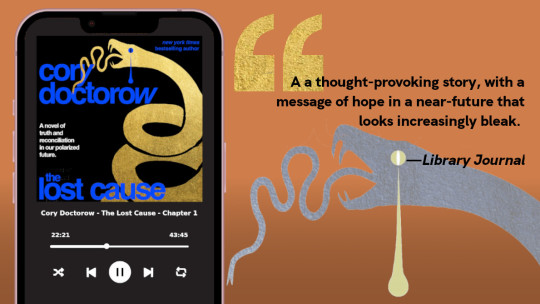
My next novel is The Lost Cause, a hopeful novel of the climate emergency. Amazon won't sell the audiobook, so I made my own and I'm pre-selling it on Kickstarter!

Image: JD Lasica (modified) https://commons.wikimedia.org/wiki/File:Elon_Musk_%283018710552%29.jpg
CC BY 2.0 https://creativecommons.org/licenses/by/2.0/deed.en
#pluralistic#twitter#posse#elon musk#x#social media#graceful failure modes#end-to-end principle#administratable remedies#good regulation#ads#privacy#benevolent dictatorships#freedom of reach#journalism#enshittification#switching costs
800 notes
·
View notes
Text




Mitch Marner Media Availability | 9.27.24
#toronto maple leafs#mitch marner#hockeyedit#egifs#2425#media availability#tried smth new w giffing w noise bc i saw someone in the tag make it look cool af but. klfjksl this is a failure#BUT HES CUTE ANYWAY#idk what that whole part was but. sweet face.
67 notes
·
View notes
Photo

(via sanewashing and wishcasting: how the press continues to fail us)
[Wishcasting is] the act of interpreting information or a situation in a way that casts it as favorable or desired, despite the fact that there is no evidence for such a conclusion; a wishful forecast. Ultimate failure for journalism the last four year. “See something, say something” has been the watch phrase since 9/11 and corporate American journalism saw it all and said nothing. Traitors. They bought in after billionaires bought them up. They let it happen -- job security over securing democracy.
Now we have to restart journalism through citizen journalists on places like Tumblr, Threads, Substack and BlueSky. Look for those truth-tellers in those places and elsewhere. I’ll try to repost their goods here so you can find them more easily. It’s all too much to consume, so find your faves, read them, and support them. Citizen journalists are the only way left to find the truth.
35 notes
·
View notes
Text



#tbh this kind of reminds me of the discourse about how the media covers school shooters#like the more they glamorize it and focus on the perpetrator the more they normalize it and even make it seem heroic in some sick way#though tbh i think ultimately a lot of this comes down to the failures of the ‘’moderate institutional’’ republican party#if they’d shut trump out instead of enabled him he would not have gotten nearly as far as he has#like trump running as an independent would have fizzled out the way RFK did#politics#usa#twitter
34 notes
·
View notes
Text


"All Property is Theft," ©Leigh Phillips / Cruising Dystopia
#artists on tumblr#digital art#net art#new media art#glitch aesthetic#internet poetry#digital collage#dark academic aesthetic#my art#concept art#gentrification#glitch artist#poetry and art#image macro#image manipulation#internet aesthetic#reading is fundamental#art of the class war#art of failure#digital artist#social commentary#jack halberstam#academic failure#aesthetic#computer aesthetic#all property is theft#art meme#creativedesign#collage art
32 notes
·
View notes
Text
𖥨 ̟⊹ ♡ mutuals only ! open to f / nb !

" i'm sorry i don't like hearing you gushing over what's - his - fuckin' - face . " ─── " why are you even still with him ? too embarrassed to tell mommy and daddy you're actually in love with a fuck up like me instead ? "
#rhodes.#open starter#mutuals only !!!!#rhodes is the black sheep type in a succession inspired family#big generational media corporation / got their hands in everything#he's the 'failure' of the family#rehab frequenter#knows he's a disappointment but can't break free from the cycle#bc he was too coddled as a nepo baby he really has no skills or direction in life
62 notes
·
View notes
Text

It was always going to end this way. The truth about Catherine Middleton’s absence is far less funny, whimsical, or salacious than the endless memes and conspiracy theories suggested.
In a video recorded and broadcast by the BBC, the princess says she has cancer and that she had retreated from the public eye to deal with her condition, while attempting to shield her children from the spotlight.
Instead, she had to contend with the internet giggling about whether she’d had a Brazilian butt lift.
My colleague Helen Lewis summed it up succinctly this afternoon: “I Hope You All Feel Terrible Now.”
What is there to learn from such a sad situation? The internet is made up of people, yet its architecture abstracts this basic truth.
As I wrote a few weeks ago, at the center of this months-long story was essentially “a sea of people having fun online because it is unclear whether a famous person is well or not.”
Underneath the memes was always something a little bit gross and indefensible.
Perhaps humans are just wired this way — to gawk and gossip.
There’s nothing new about hounding a member of the royal family or invading the privacy of a celebrity to sell tabloids or go viral.
You don’t even have to be a scold about it: Famous people are wealthy and beloved at least in part because they’re fun to talk about.
Exactly what we do and don’t know about their internal lives is part of the allure — the discourse comes with the territory to a degree.
But Catherine Middleton, of course, is a human too.

During this saga, I kept thinking about the reappraisal of Britney Spears in 2021, as well as the backlash toward past media and tabloid coverage of her rise.
A New York Times documentary dredged up old coverage of Spears from the mid-aughts, showing a young woman clearly in distress, being picked apart by glossy magazines.
Her suffering became entertainment. The response to this film was swift.
Some of the people and institutions that had shamelessly delighted in her pain backtracked: Glamour publicly apologized to the pop star on its Instagram account, noting, “We are all to blame for what happened to Britney Spears.”
Contrast the Spears reckoning with the Middleton drama and, if you’re being generous, you can see some of that newfound attitude in the media.
I was struck by Lewis’s observation that “Britain’s tabloid papers have shown remarkable restraint” throughout this mess.
Progress, perhaps, but what’s also telling is that they didn’t really need to do the dirty work: Random people on the internet were doing it for them.
They recklessly speculated, memed, and used their amateur sleuthing and networked faux expertise to concoct elaborate, semi-plausible explanations for her absence.
Was Catherine’s face actually Photoshopped from a Vogue spread? It wasn’t, but the conspiratorial tweet got 51.1 million views anyhow.
Missing from much of the discourse was the idea that its main character was a person who was likely struggling.
In essence, the internet democratized the tabloid experience, turning the rest of us into paparazzi and addled editors workshopping headlines and cover images — not to sell magazines but to amass some kind of fleeting online popularity.
In my least charitable moments, I see this toxic dynamic as the lasting legacy of social media — a giant, metrics-infused experiment in connectivity that has had a flattening, pernicious effect.
In 2021, I interviewed Elle Hunt, a journalist who’d tweeted an innocuous opinion about horror movies one evening and woke up to find she was trending on Twitter, her feeds choked with thousands of furious replies and threats.
When I asked her to describe the experience of becoming Twitter’s main character for the day, she summed it up thusly:
“You’re repurposed as fodder for content generation in a way that’s just so dehumanizing.”
Three years later, these words resonate even stronger.
What Hunt described to me then as “a platform failure,” feels to me now like a learned behavior of the internet, where people, famous and not, are repurposed as fodder for content generation. The cycle repeats itself endlessly.
This afternoon, the memes about Middleton shifted — from jokes about her whereabouts to jokes about how awful it was that everyone had been making fun of a cancer patient.
Feeling bad about the memes tweets immediately became a meme unto themselves.
Despite the tone shift, the reason for these posts is the same: They’re a way to take a person and repurpose their life for entertainment and engagement.
If this sounds exhausting and depressing, it’s because it is.
But the internet is also too big to be one thing. Clicking through social media this afternoon, I saw dozens of heartfelt testimonials, apologies, and well-wishes for the princess.
For a moment, from my perspective, it felt like watching a collective of people come to their senses.
A recognition, perhaps, of the humanity of the person at the center of the maelstrom.
Then, only a few seconds later, I saw a different post. It was a screenshot from the blockchain platform Solana, where users can create their own cryptographic tokens for others to invest in.
The name of the token in the screenshot is “kate wif cancer,” and its logo is a still of the princess sitting on a bench, taken from this afternoon’s video.
The coin’s market cap briefly surpassed $120,000. Only six minutes later, the price had cratered — the result of a standard memecoin sell off.
An awful thing happened. Some people made a joke about it. Other people made some money. And then everyone moved on.

NOTE: Edited
#Princess of Wales#Catherine Princess of Wales#Catherine Middleton#Kate Middleton#British Royal Family#cancer#chemotherapy#internet#memes#fake news#disinformation#misinformation#platform failure#social media
57 notes
·
View notes
Text
not to be controversial, but I'm starting to hate the math defenders on this app, like some people take it weirdly personally if you say you hate math, and I know this is a hard pill to swallow if you were praised as a child, but it's literally not about you
#a lot of us are actually traumatized by our academic failures so im fucking sorry i dont enjoy doing math jesus christ#if i have to share an internet with people who say “the curtains were just blue😝😝🤪” you have to deal with some people not liking math#atleast im not insulting the mere concept that its worth learning#“omg its so funny that they tried to teach us more than basic reading and writing” and you guys wonder why we have a media literacy problem#attictictic
23 notes
·
View notes
Text
Heads up that the following post discusses the poster photographed at this link. The link shows an antisemitic poster (this post will discuss why and how it is antisemitic as well as why everything about it is done in bad faith from a shady organization that should not be trusted).
You do not need to click the link to understand the content of this post, but you can choose to do so for context.
TRIGGER WARNINGS FOR THE POSTER:
Child death, child endangerment, starvation, war zones, body horror, graphic imagery
Link: https://www.tumblr.com/edenfenixblogs/750494095702704128/trigger-warnings-child-death-starvation-war
Ok, let’s get into it.
Part 1: Why Is It Antisemitic?
1. It starts by putting Jews on the defensive
This poster instantly puts any Jew who takes issue with the phrasing or rhetoric on this poster as a lying villain falsely accusing good people of bigotry in order to support a genocide. What about people who disagree with Israel’s bombardment of Palestine, but who also think this poster is antisemitic? Where will they be heard? How will their concerns be addressed?
2. It only addresses the needs of non-Jews
The goal to disarm people in a conflict is a good one! Why is it only Israel that must be disarmed when Israel is also receiving incoming bombs on a daily basis? Is that peace? Or is that a call for one side to be murdered? How does this address the stochastic threat that Jews outside of Israel are facing?
3. It offers no solutions for peace
After Israel is disarmed, what is the goal for the Israeli people and state? How will Israelis be protected? Should they have any protection? How will the defend against bombs from Hamas and Lebanon? What treaties will be negotiated to enable peace? How will antisemitic extremists be deradicalized? What policy-based or judicial systems or safeguards will be put in place to guarantee safety for both Palestinians and Israelis? Taking weapons away from one side of an armed conflict doesn’t create peace. It creates an unarmed target. I am a pacifist and against all war. But I am also against taking weapons away solely from the side that popular OR unpopular opinion deems “wrong.” Stopping destruction in Palestine—especially on the scale in which it is occurring—is vital. But that alone does not ensure peace or even encourage peace. All it does is disarm people. Peace is a negotiated state of existence not a lack of weaponry.
4. It mispells antisemitism
I am not inclined to believe that a person or organization who cannot spell antisemitism has a clear or complete understanding of what antisemitism entails or how it expresses itself in society.
Part 2: Source Evaluation (TL;DR: Abject failure across the board)
1. Not on charity navigator
Taxpayers for peace does not appear on charity navigator at all. I must question whether or not it is in fact a charity or simply a lobby. I also have no way of assessing the companies funding, spending, or transparency—because they do not provide information on the website.
2. No funding information on the website itself
I touched on this in the above bullet point. But it is really important in this conflict to know exactly where the money you give is going and where an organization is getting most of its money from. Hamas got its start from the charities associated with the terrorist organization, The Muslim Brotherhood. (^^I will be Reblogging this post with more info on this but don’t have time to address this all with photos and links in this post. For now, here are the linked Wikipedia sources and a screenshot of the info in question. As always with Wikipedia, consider it a starting point and read the sources the page cites, not just the wiki article)
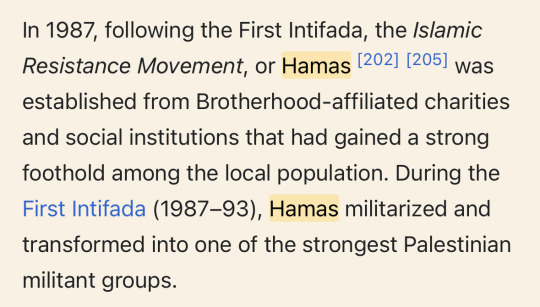
3. Several source links are dead.
Not many sources are available on the taxpayersforpeace website, and they certainly do not have a tab specifically devoted to sources.
Here is the list of sources.
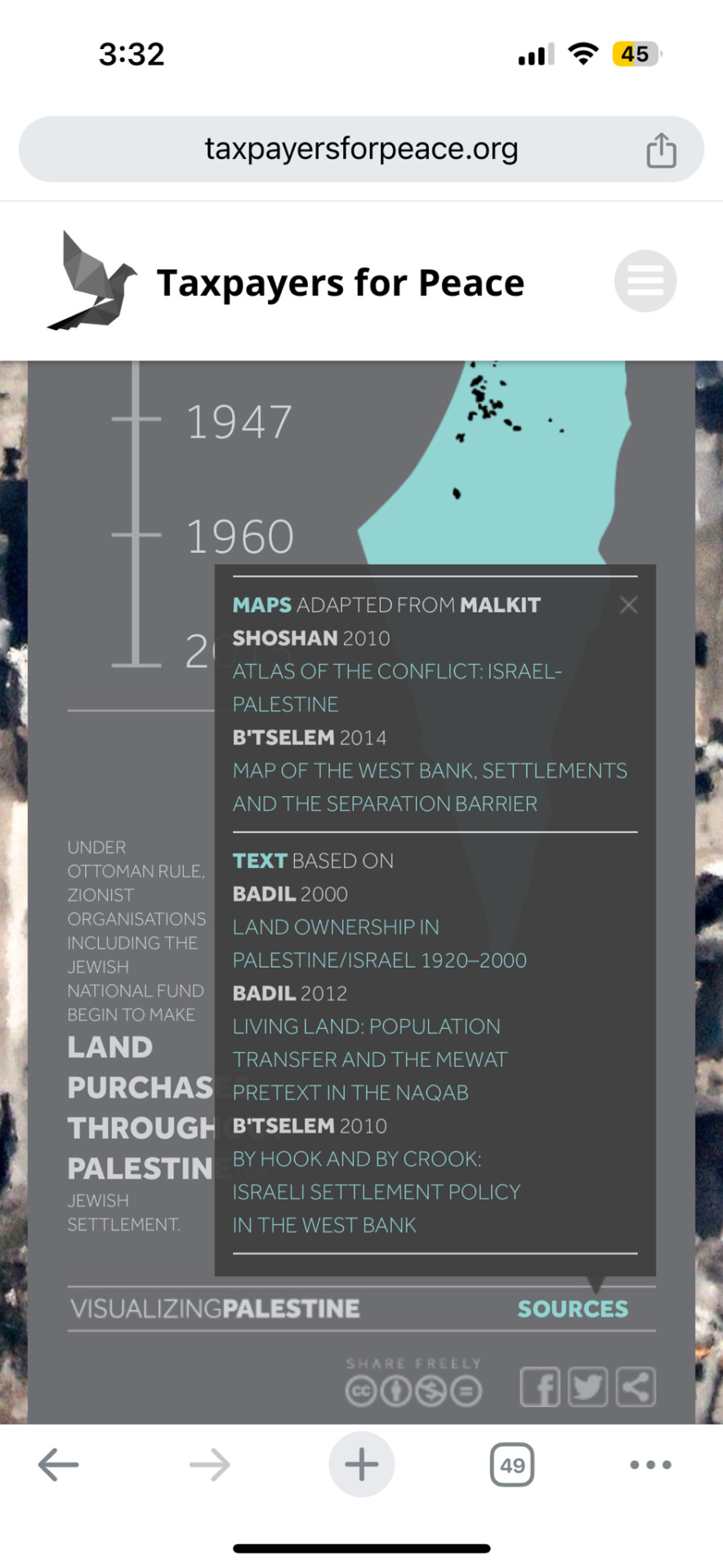
The two Badil links are dead:


4. Available sources are sparse
Of the few sources there are, there are only three actual organizations responsible for them: B’Tselem, Badil, and Architect and Academic Malkit Shoshan’s seminal work, Atlas of a Conflict.
The sources from Badil lead to dead links, leaving only Shoshan and B’Tselem. Two sources are not enough to support an entire website. Two sources are not even enough to support an academic paper.
5. Available sources are outdated
None of the sources of this constantly evolving and ongoing conflict were written within the last decade. Even if these sources are considered legitimate, it is odd that more recent ones were not included.
6. The available sources are used manipulatively
So, we have two sources. Let’s look at them.
Source 1: Malkit Shoshan
By all accounts, she is a highly respected and credible source on architecture, spacial design and planning, and the way that the small space shared between Israel and Palestine has shifted to be dominated by Israel over the past several decades. She has been continually critical of Israeli settlements in the West Bank (as have I) and has been extremely consistent in including Palestinian voices and struggles in her advocacy for peace (as have I).
She also supports BDS (which I do not).
Her work has explores the relationship between architecture, urban planning, and human rights.
She is respected but also controversial source on the conflict. She has signed her name to a Harvard faculty letter (as a member of the faculty) endorsing BDS and Palestinian Solidarity. Her work is sure to ruffle some feathers. (The letters to which this one responded are also linked within the above link, providing several perspectives on the matter during a previous flare of the ongoing conflict—from before 10/7)
However, while she very well might be anti-Zionist, I have not been able to find any statements by her to the affirmative in this case. If anyone has such statements I welcome them in order to provide a more thorough analysis of her as a source. But from what I could gather, she views herself as a progressive seeking peace between Israel and Palestine.
And while she would characterize many aspects of Israeli treatment of Palestine as colonial in nature (a statement which I do not agree with as a blanket statement about Israel as a whole, but for which she provides compelling evidence in certain instances, especially in the West Bank), I have yet to see her call the whole of Israel as a colonial project. In fact, she views Israel as a whole as post-colonial, according to her most recent interview with Haaretz. In fact, she seems to reject the idea that violence from either side is appropriate or necessary in order to attain peace—and on this matter, I occur wholeheartedly:
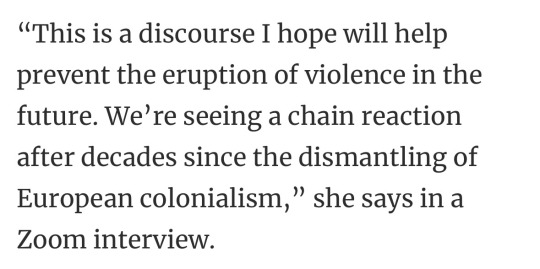
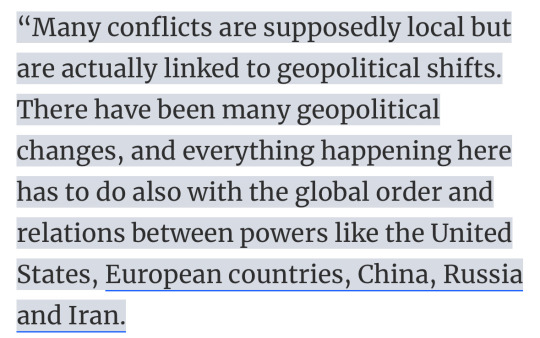
She states that she prefers to engage in discourse rather than violence. She discusses European colonialism as a decades-bygone problem because of which we are still dealing with tremendous fallout internationally. Additionally, she goes on to say that other nations are using the conflict in Israel and Palestine to suit their own geopolitical ends. And she does not isolate American, European, or Middle Eastern nations as uniquely manipulative in this matter. She acknowledges that every side has an agenda.
Her work seeks to humanize Palestinians. Not dehumanize Israelis. I have found no evidence that she would sign her name to a statement condemning Israel and the US of collaborating to commit genocide—let alone a billboard with graphic, triggering imagery. Her work focuses on building a better future—helping internally displaced Palestinians speak with their governments and organizations on their own behalf to obtain equal access to civic resources—in a shared homeland that prioritizes humanity, cohabitation, mutual acknowledgment and respect, and a peace. As controversial as her work is, she makes sure to participate in what she calls “productive disagreement,” including bringing together frequently opposing Israeli and Palestinian voices.
She has written award winning books and been involved with thought-provoking art installations, yet all of her work focuses on improving Palestinian welfare and recognition, not tearing Israel or Israelis down or telling the US to unilaterally disarm Israel entirely. She focuses primarily on how life within the Levant can be improved, not on international military relations.
Her own personal Twitter account acknowledges the pain of all involved, including Israelis’. And she seeks an end to the conflict, not a victor.
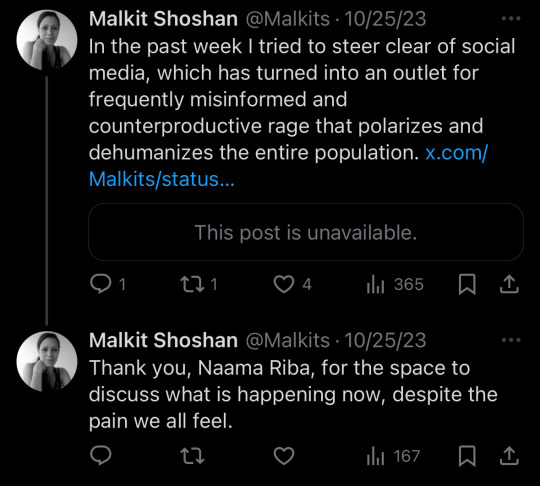
One thing is clear: She does not want her name associated with poorly sourced information, inflammatory rhetoric, or “counterproductive rage” that dehumanizes anyone.
(SOURCE EVAL TL;DR: AN INTERESTING AND COMPELLING SOURCE PROVIDED WITHOUT ADEQUATE CONTEXT AND MANIPULATED FURTHER A ONE-SIDED AGENDA)
Source 2: B’Tselem
This is certainly a more interesting source than I have seen cited by anti-Israel folks than most others. First of all, the source seems to originate from within Israel.
Encouragingly, they do actually appear on charity navigator with a 94% rating.
Despite this, I have a few problems related to this rating.
This rating is based on data from no later than 2021
The charity has not posted tax documents on its site
They have not provided access to board meeting minutes.
Its entire score is calculated based only on financial data that is three years out of date. There is not data on its impact as an organization, measurement of data, internal culture and community, or analysis of its leadership. It’s essentially a stamp of approval that the financial documentation sent to charity navigator 3 years ago was in order.
It is harshly critical of Israel’s allowing settlements in the West Bank as well as of many of its policies toward Palestine and treatment of Palestinians. In large letters near the bottom of its page, it states:
“Israel’s regime of apartheid and occupation is inextricably bound up in human rights violations. B’Tselem strives to end this regime, as that is the only way forward to a future in which human rights, democracy, liberty and equality are ensured to all people, both Palestinian and Israeli, living between the Jordan River and the Mediterranean Sea.”
Given that the organization claims to want equality for Palestinians and Israelis, I doubt they would support a unilateral disarmament. Even though the site itself is tremendously biased against Israel in general (having an article on Israeli use of human shields, but not an extant or equally visible source on Hamas’ use of human shields, which is also well documented). Even this organization acknowledges that crimes against Israeli civilians are indefensible and violate international law and the goal of peace.

(Link to full article found in the text above the image)
Additionally, the organization admits that 50% of its funding comes specifically from outside of Israel. This is intriguing on its own, but I am also suspect of the accusatory manner in which they declare that the law requiring that they disclose this information is meant to “equate their funding with disloyalty.”
To me it is not even the admission that the funding comes from outside of Israel that troubles me. Rather, it is the admission that the funding comes specifically from state sources outside of Israel. Given the relevance of the aforementioned historical precedence that Muslim Brotherhood affiliated “charities” gave rise to Hamas, I would consider the source of funding in charities related to the conflict to be uniquely relevant. The antagonistic tone of the declaration as well as the small text with which it is declared and its placement at the very bottom of the website makes me suspect of the funders in question.

Relatedly, I could not find any financial documents or materials providing transparency in their funding or organization.
Another suspicious bit of information I found is that their Fatalities Statistics database only includes fatalities in the West Bank up to October 31. But it does not include any fatalities in the Gaza Strip OR ISRAEL past 10/6/2023–a day that might alter their data about the Israeli death toll a little.

To be very clear: this does not and will never justify the bombing of Gaza and Rafah. But it fully erases the attack by Hamas against Israel on 10/7/2023. I find this omission highly suspect. And the lack of acknowledgment of Hamas’ attacks on 10/7 or the ongoing incoming missile attacks from Hamas and Lebanon by B’Tselem in its statistics section to be a glaring omission on an organization that supposedly wants peace for all.
I also don’t see a list of sources from which they collect their data or any attempt to differentiate Palestinian citizens from Hamas combatants.
Finally, as I typically champion interfaith and intercultural organizations devoted to peace and relief within Israel and Palestine, I looked for B’Tselem on the Alliance for Middle East Peace website. B’Tselem did not appear on their list of 160+ affiliated/member-charities.
However, you can find those 160+ charities here: https://www.allmep.org
SOURCE EVALUATION TL;DR: Even though the source is flawed and would not pass muster on a full source evaluation in general, even this source itself claims to want violence against Israel to stop, leading me to believe it too would stop short of calling the current situation a genocide—although it would definitely call what is happening to Palestinian civilians in Gaza and Rafah a war crime, indefensible, and untenable (with which I am inclined to generally agree). I was unable to find a search function on the website, so I can’t be 100% certain that they didn’t use the word genocide, but that word seems at odds with their general mission statement, despite their bias. The site also calls for a release of Israeli hostages as well as acknowledging the attack by Hamas on 10/7 as horrific. Based on this information, despite my many problems with this source, even it does not call for unilateral disarmament. It calls for the expulsion of Israeli presence in the West Bank (in accordance with the law), an end to violence, and a release of Israeli hostages.
7. The sources are not provided by Taxpayersforpeace.
The few sources I was able to find for this website originate from VisualizePalestine—a tremendously problematic organization that also fails to appear on charity navigator.
I will included links on my next post about all this cuz I’m beat right now, but: It cites sources that insist on calling the IDF the IOF (tremendously inappropriate in an official document), legitimizing the Muslim Brotherhood, and reframing the intifadas as justifiable acts of resistance—something not even B’Tselem condemned. In general, VP’s entire goal seems to be to “change the narrative” from anti-Palestine to anti-Israel. And that will never support a peaceful future.
Despite my issues with the two sources listed in the graphic pictured above from VP—I find myself in full agreement with the statements at the heart of both Shoshan’s and B’Tselem’s arguments: The future must be geared toward attaining peace for all. Not casting one side or the other as the bad guy or good guy. Tremendous violence has shaped the lives of Israelis and Palestinians for my entire life and since long before I was born. We don’t need to swap our ideal victors. We need to end conflict for everyone. And not by just letting one side or the other be slaughtered, but by negotiating peace.
As always, please click my media analysis tag for more analysis of sources across the political and bias spectrum as well as for insight into how and why I evaluate as I do.
#media literacy#source evaluation#source evaluation: failed#source evaluation: critical failure#Palestine#Israel#i/p#i/p conflict#choose peace#always#antisemitism#leftist antisemitism#jumblr#child death#starvation#graphic imagery
38 notes
·
View notes
Text
(lyrics updated 25/01/24 thanks to an anon source)
Open your eyes and say hello To the fact that you made plans and they were overthrown Chasing the hope that you could leave From the first mistake to the last intake of breath you breathe
Time and time again they tell you, The future fits with all the letters Wishing you could take back what they told you was not yours Decisions made for desperate measures When time ran out before you even Made your choice Its not a fair reflection of you
Reach for the light (Let inspiration heal the wounds they caused) This life is yours (Every second wasted incomplete) Take back the light (The fight inside you re-ignited) Evermore, this is your choice
Everyone will tell you what they know But the fact remains that you dont know where you should go What the hell is going on Cause somewhere along line everything you had went wrong
Reach for the light (Let inspiration heal the wounds they caused) This life is yours (Every second wasted incomplete) Take back the light (The fight inside you re-ignited) Evermore, this is your choice
You are not a faliure
I was thinking about reformatting them and fixing the spelling but decided against it. This man can't spell the same way I couldn't spell at his age and it makes me oddly happy. I also thought about retitling the mp3 to Faliure but also decided against that for the same reason lol.
#lost media#circa 2011#song failure#it's a guess on the year since we don't have any info on this one#no screenshots or urls or anything#also a guess on the lyrics because of that#i'm 100% confident these are cubase drums tho#so friday completely crept up on me#i was unprepared so i went in alphabetical order#worked out in your favor though huh?#this is a 100% certified banger#“you are not a failure” -> me at ves#also me and ves at all of you#ily guys
63 notes
·
View notes
Note
I don't disagree that fandom ran further with the concept of fuckeries, but I would say that 1x04 is an important spiritual successor to the concept that felt like it was going to be significant. The first demonstration we got of how good Ed and Stede could be together was the lighthouse escape, which I would definitely count as a fuckery. It's a clever, creative victory that doesn't require violence, and it seemed to sate Ed's s1 stated appetite for drama/excitement/fun without triggering him.
Continuing from here... I mean I personally agree with you, but that's also mainly what I was talking about with fandom giving the idea more importance and interest than canon did.
I think a lot of people - myself included - drew that connection from 1x04's proto-fuckery to getting a name for it (and its potential role as a raid alternative) in 1x06 to Stede becoming a true student in 1x10. More detailed examples went for looping in 1x02 and/or 1x05 to show Stede leaning toward trickery over force.
The point isn't that the fandom (basically all of us, not a few outliers) was wrong to run with this - I think it was brilliant, actually, and a big part of why I even cared about writing meta about the pirate society of a romcom - but that the canon of S2 didn't pick the idea back up at all in a way that indicates it was never going anywhere. The pattern we spotted in S1 was apparently not the interesting comedic alternate to action/adventure swashbuckling, but something (significantly more boring tbh) that served to buoy our underdog Stede along without dying until he was far enough in his pirate journey to swing a sword successfully.
Is the lighthouse escape the first demonstration in a larger pattern of how Ed and Stede will work together in the future? Where their mutual tendencies toward creative solutions and dissatisfaction with abusive and violent pirate culture can find a new, more fun way of life?
Or is it a, yes, clever and creative escape they come up with together, but one that only has those specific traits because they are in an impossible situation where they can't fight their way out - narratively because the ship is stranded and crewed by useless pirates, and meta-narratively because they need Stede to contribute as an equal instead of just getting rescued (that was for last episode) and he can't do that in a fight yet?
We thought that the lighthouse plan was supposed to connect to 1x06 and 1x10, but I think it might have only been meant to serve as a fix to Ed's fog and full moon plan (i.e. making an impossible escape).
They just looked similar because all the various wins and conflicts of S1 were shaped around Stede's character journey, but the part of that journey where he can't jump into the fray and kill the mooks too as a real pirate ended with 1x10. Which is why they don't come up with a brilliant way to slip out of the Republic without a fight in 2x08. Stede doesn't need the genre crutch anymore. He is a swashbuckling hero now, and he and Ed can kill people side by side.
You know, once the trauma-based reasons they might not do so are healed by "something something... love maybe?"
#i am significantly less interested in this canon than i was in the one where i thought being silly tricksters would be the norm#and i think it shows a critical failure to consider that maybe the silly tone of S1 was what differentiated it from other pirate media#but i do think s2 going more action/adventure recontextualizes several bits of s1 - including this one#(also tbh bad writing not following up with character work)#our flag means death#ofmd s2#ofmd critical#< i don't think the last one was but this one definitely throws more shade#ofmd meta#ofmd 2x08#ofmd 1x04#stede bonnet ofmd#blackbeard ofmd#ofmd piracy#genre#ladyluscinia#ask#anon
61 notes
·
View notes
Text
Some people ask me "why are you so obsessed with the Mystery Kids' franchises?" and truth be told I think something just hits me about stories where children are tasked with repairing the multi-generational damage caused by their elders.
#Coraline is the shakiest example of this but if you count the Bedlam as an adult and what she did to Wybie's grandma's family it checks#Coraline#Paranorman#Psychonauts#Gravity Falls#The Stan twins had a petty multi-decade rivalry that nearly destroyed the universe several times#Ford Cruller is a war criminal who truamatized all his friends and trapped himself in a mental prison made of his own failures#Norman takes the cake tho for having to unravel a 300 year old cycle of trauma that was only getting kicked down the road#This is a recurring theme in media and it's starting to feel like a desperate cry for help
100 notes
·
View notes
Text
I get most people only care about the singularity for memes and don't appreciate his character at all... and he is just a fictional character.... but wow I hate it so much when people call hux, the "transgender allegory" killer, by the wrong pronouns.
He is NOT an "it." his lore literally mentions him changing his pronouns from the ones he was given by humans to ones HE personally identifies with.

the transgender themes are not subtle at all, in any of his lore. there is even a scene in the archives in which he injects himself with genetic material in order to create his "perfect form."

how much clearer can they get without slapping a fucking pride flag on his face?
#dbd#hux a7 13#thoughts about media#I love hux with my entire heart. and if you do not? well that's not my failure to fix.#but show my man some fucking respect!#he's one of the cooler original killers!!! I like that they took the typical “evil AI bent on destroying humanity” sci fi character-#-and did something different with the idea!#also he has the most graphic mori in the entire game. one that actually makes survivors afraid to be caught.#there really is nothing quite so satisfying as finally catching the little gnat of a survivor who's been annoying you-#-and popping their fucking face right open.#he's got the juice that turns the ordinary- extraordinary! fruit gushers baby ;)#all dbd fans know is how to dick ride felix and vittorio though so I do NOT know why I ever expect better.
59 notes
·
View notes